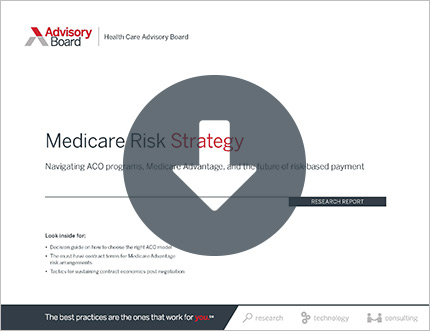Auto logout in seconds.
Continue LogoutCMS late last month released an advance notice of proposed changes to Medicare Advantage's (MA) risk adjustment payment model.
Health insurance 101: Get the slide decks
About the risk adjustment model
CMS uses MA's risk adjustment model, known as the CMS-HCC Risk Adjustment model, to determine payments for MA plans. Under the model, MA plans assign each beneficiary a risk score based on medical coding that reflects the beneficiary's medical condition. Beneficiaries with poorer health will have higher risk scores, while healthier beneficiaries will have lower risk scores. MA plans are given higher payments for beneficiaries with higher risk scores than they are for beneficiaries with lower risk scores.
CMS in December 2017 released an advance notice that proposed adding conditions related to chronic kidney disease, mental health, and substance use disorders to the risk adjustment model beginning in 2019. CMS also proposed changing the risk adjustment model to account for various technical updates, such as further incorporating encounter and inpatient data into a beneficiary's risk score.
In addition, CMS proposed changing the risk adjustment model so it accounts for beneficiaries' total number of medical conditions that qualify for the risk adjustment model, as required under the 21st Century Cures Act. To meet that requirement, CMS proposed two new models:
- The Payment Condition Count (PCC) model, which would account for the total number of medical conditions a beneficiary has that are included in the payment model; and
- The All Condition Count (ACC) model, which would account for the total number of medical conditions a beneficiary has that are included in the payment model, as well as conditions that are not included in the payment model.
CMS accepted public comments on the advance notice, and ultimately postponed implementing the changes after stakeholders demonstrated little support for the ACC model, requested CMS delay the PCC model's implementation, and requested additional information on the PCC model.
CMS moves forward with risk adjustment changes
CMS in the advance notice released last month proposed phasing in many of the changes it had proposed in 2017. CMS said the Cures Act requires the agency to phase in the proposed changes by 2022
CMS in the new advance notice indicated that the agency plans to implement the PCC model in 2020, but the agency also proposed an alternative model similar to PCC that incorporates conditions related to dementia and pressure ulcers.
CMS in the advanced notice proposed calculating 2020 risk adjustment payments using:
- 50% of the risk adjustment model criteria the agency used to determine 2017 and 2018 risk adjustment payments; and
- 50% of the newly proposed payment model.
CMS also proposed incorporating encounter and inpatient data into a beneficiary's risk score beginning in 2020. To do so, CMS said it would base:
- 50% of the risk score on fee-for-service data, down from 75% in 2019; and
- 50% of the risk score on encounter data, up from 25% in 2019.
CMS will accept public comments on the latest advance notice through Feb. 19. CMS said it will finalize all changes to MA payments for 2020 in an annual rate announcement that the agency will release by April 1 (Livingston, Modern Healthcare, 12/20/18; Morse, Healthcare Finance News, 12/20/18; Romoser, Inside Health Policy, 12/20/18 [subscription required]; CMS advance notice, 12/20/18).
Health Insurance 101: Get the slide decks
Confused about the U.S. health insurance system? You're not alone—it's one of the most complicated systems in the world. If you missed our recent webconference series diving deep into the system, don't worry; we've got you covered.
Review the slide decks from our recent webconferences for a quick overview of each program:
Don't miss out on the latest Advisory Board insights
Create your free account to access 1 resource, including the latest research and webinars.
Want access without creating an account?
You have 1 free members-only resource remaining this month.
1 free members-only resources remaining
1 free members-only resources remaining
You've reached your limit of free insights
Become a member to access all of Advisory Board's resources, events, and experts
Never miss out on the latest innovative health care content tailored to you.
Benefits include:
You've reached your limit of free insights
Become a member to access all of Advisory Board's resources, events, and experts
Never miss out on the latest innovative health care content tailored to you.
Benefits include:
This content is available through your Curated Research partnership with Advisory Board. Click on ‘view this resource’ to read the full piece
Email ask@advisory.com to learn more
Click on ‘Become a Member’ to learn about the benefits of a Full-Access partnership with Advisory Board
Never miss out on the latest innovative health care content tailored to you.
Benefits Include:
This is for members only. Learn more.
Click on ‘Become a Member’ to learn about the benefits of a Full-Access partnership with Advisory Board
Never miss out on the latest innovative health care content tailored to you.


